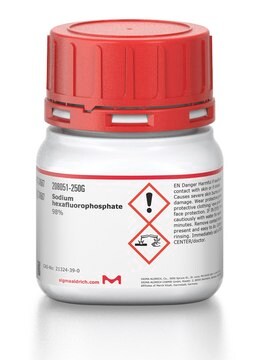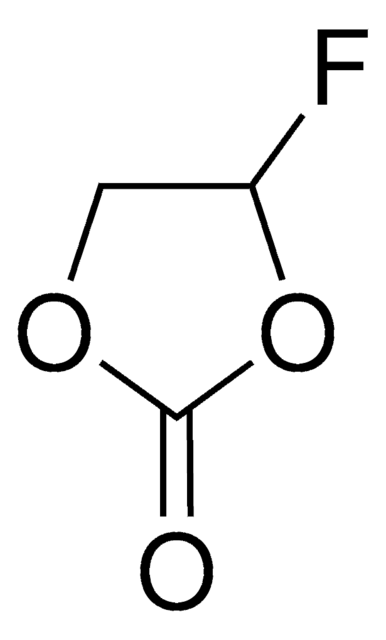809950
Ethylene carbonate
battery grade, ≥99%, acid <10 ppm, H2O <10 ppm
Synonym(s):
EC, 1,3-Dioxolan-2-one
About This Item
Recommended Products
grade
battery grade
Quality Level
vapor density
3.04 (vs air)
vapor pressure
0.02 mmHg ( 36.4 °C)
Assay
≥99%
form
solid
impurities
≤10 ppm H2O
≤10 ppm acid
bp
243-244 °C/740 mmHg (lit.)
mp
35-38 °C (lit.)
36 °C (exp.)
density
1.321 g/mL at 25 °C (lit.)
application(s)
battery manufacturing
SMILES string
O=C1OCCO1
InChI
1S/C3H4O3/c4-3-5-1-2-6-3/h1-2H2
InChI key
KMTRUDSVKNLOMY-UHFFFAOYSA-N
Looking for similar products? Visit Product Comparison Guide
General description
Application
Caution
Legal Information
related product
Signal Word
Warning
Hazard Statements
Precautionary Statements
Hazard Classifications
Acute Tox. 4 Oral - Eye Irrit. 2 - STOT RE 2 Oral
Target Organs
Kidney
Storage Class Code
11 - Combustible Solids
WGK
WGK 1
Flash Point(F)
289.4 °F - closed cup
Flash Point(C)
143 °C - closed cup
Certificates of Analysis (COA)
Search for Certificates of Analysis (COA) by entering the products Lot/Batch Number. Lot and Batch Numbers can be found on a product’s label following the words ‘Lot’ or ‘Batch’.
Already Own This Product?
Find documentation for the products that you have recently purchased in the Document Library.
Customers Also Viewed
Articles
Experts discuss challenges and production processes of nickel-rich layered oxide cathode materials in energy storage systems.
Due to the adverse impact of the continued use of fossil fuels on the earth’s environment and climate, researchers have been asked to develop new approaches for producing power using renewable sources like wind and solar energy
Ionic liquid electrolytes explored for rechargeable batteries' advancement; future IL development discussed.
Our team of scientists has experience in all areas of research including Life Science, Material Science, Chemical Synthesis, Chromatography, Analytical and many others.
Contact Technical Service










